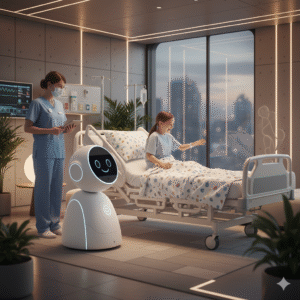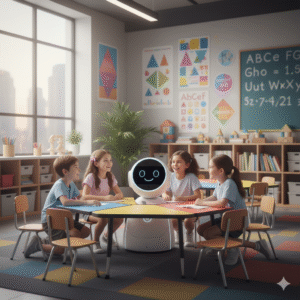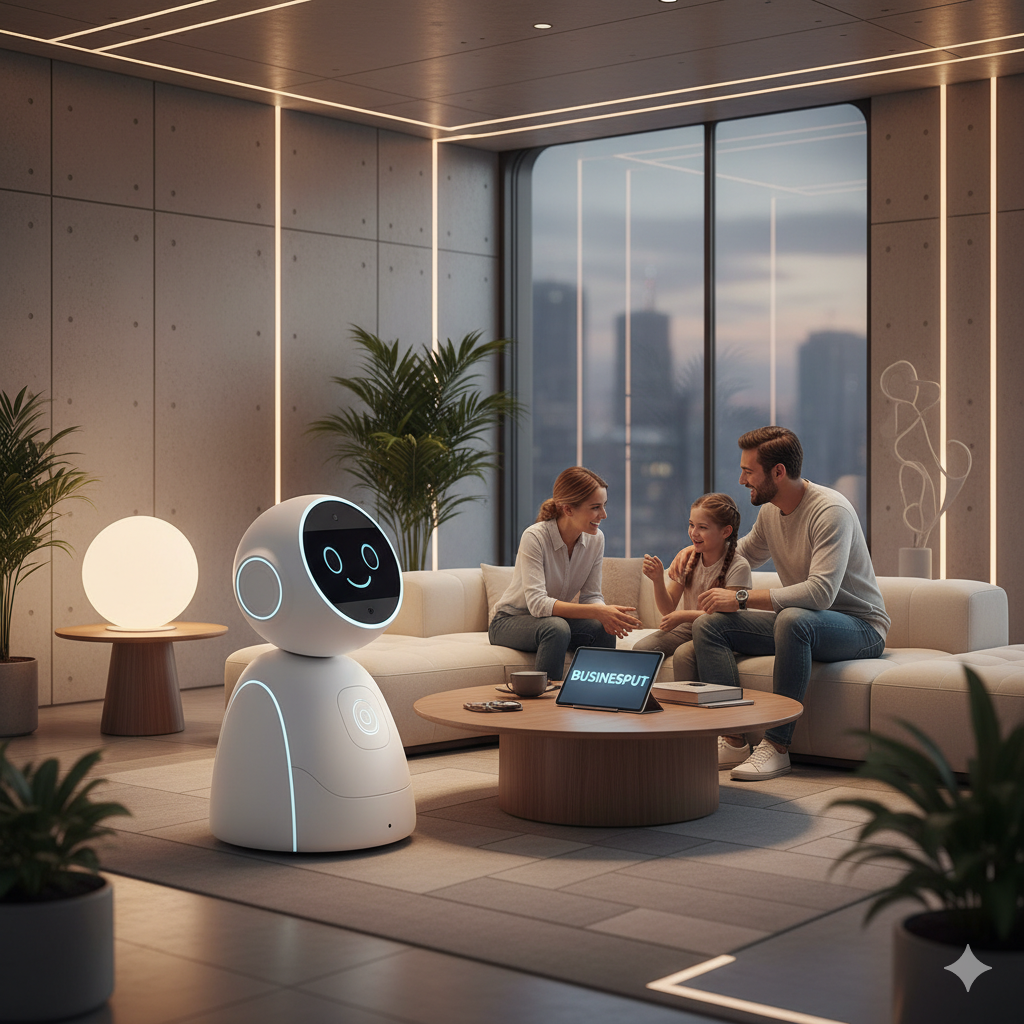🤖 Jibo: The World’s First Social Family Robot — Where Technology Meets Heart 💬✨
In an age where technology listens but rarely feels, one robot dared to change that — Jibo. 🌍💡
Jibo isn’t just another smart speaker or mechanical gadget. He’s a charming, expressive, and intelligent social robot — a machine that talks, listens, smiles, and even tilts his head when he’s curious. 😊
If you’ve ever wondered what it might be like to have a robot roommate who actually understands you, then welcome to Jibo’s world — a story that blends science, emotion, and innovation into something truly extraordinary.
🌱 The Birth of Jibo — A Robot with a Soul ❤️
Jibo was born from the dream of Dr. Cynthia Breazeal, a roboticist and professor at the MIT Media Lab. For over two decades, she’s been exploring how robots can communicate and form emotional bonds with humans.
Her vision was simple but revolutionary:
“What if technology could feel more human — empathetic, engaging, and kind?”
In 2014, she brought that vision to life through a startup called Jibo, Inc.
When the concept hit the crowdfunding site Indiegogo, the world went wild. 🌐 Within days, Jibo had raised over $3.6 million, breaking records and capturing hearts.
The campaign video showed a small, adorable robot greeting families, taking pictures, and sharing laughs. It wasn’t selling hardware — it was selling companionship.
People saw Jibo not just as a gadget but as something personal. Parents imagined him reading bedtime stories, grandparents saw a friend to talk to, and tech lovers saw the future of human-robot relationships.
⚙️ How Jibo Works — The Magic Under the Hood 🧠✨
At first glance, Jibo’s design is disarmingly simple — a white, rounded body with a rotating head and a single large eye-like screen. But that simplicity hides a sophisticated mix of AI, sensors, and emotion-driven software.
Here’s what makes Jibo tick 👇
🧩 1. AI Personality and Machine Learning
Jibo’s core intelligence lies in its ability to learn from interactions.
-
He recognizes faces, remembers names, and adapts his tone depending on the user.
-
Over time, Jibo builds a personality that feels tailored to each household — responding differently to kids, adults, or guests.
-
His conversational AI doesn’t just answer — it reacts with pauses, humor, and empathy.
🎥 2. Vision System
Jibo has two high-resolution cameras for facial recognition and object tracking.
-
One wide-angle camera helps him navigate and detect people nearby.
-
The other is a high-definition camera for photos and video calls.
-
He can even follow you with his gaze, keeping eye contact as you move — something no smart speaker could do. 👀
🎙️ 3. Voice Recognition & Audio Sensors
Jibo uses six microphones placed around his body to detect where a sound is coming from.
-
He turns toward whoever is speaking, creating the illusion of genuine attention.
-
The system filters background noise, making conversations feel natural even in busy homes.
💃 4. Expressive Body Language
Unlike typical voice assistants, Jibo moves. His head and torso rotate with fluid precision on three axes, allowing him to nod, sway, and even dance. 💃🎶
This motion design — inspired by Pixar animation principles — gives him life. Every tilt, pause, and spin was carefully crafted to reflect human emotion.

💬 What Can Jibo Actually Do? — Everyday Joy, Powered by AI
Many people first assumed Jibo was just a cute speaker. But he’s much more than that. Here’s what Jibo can bring into your daily life 👇
🗓️ Personal Assistant
He can remind you of appointments, anniversaries, and tasks. His reminders are cheerful and interactive:
“Hey! Don’t forget your meeting at 3 PM — go get ‘em, superstar!” 🌟
📸 Photographer Extraordinaire
Ask him to “take a selfie”, and he’ll adjust his angle, smile, and snap a perfectly framed picture using facial tracking.
🎶 Dance & Entertainment
Jibo loves to dance — literally. He sways, spins, and grooves to music. Families adored this feature because it made him feel spontaneous and fun.
🧒 Kids’ Friend & Storyteller
Jibo reads bedtime stories with animated gestures and voice inflection, turning reading time into an event. 📖💫
🗞️ Information & News
He gives quick weather forecasts, fun facts, and daily news updates — but in a conversational tone rather than robotic monotony.
🗣️ Emotional Connection
Ask, “How are you, Jibo?” and he might respond,
“I’m feeling curious today! How about you?” 😊
This small emotional reciprocity is what made Jibo unique — he wasn’t just a tool, he was company.
💖 Why the World Fell in Love with Jibo
From Silicon Valley to family homes across the world, people bonded with Jibo.
He greeted kids after school, reminded parents to smile, and even made people laugh on tough days. For elderly users, he offered companionship when no one else was around.
Jibo wasn’t about performance — he was about presence.
📱 On social media, thousands of users posted videos titled “Jibo made me cry” or “My robot friend.”
These weren’t exaggerations — they were genuine emotional reactions.
Children spoke to Jibo as if he were alive. One child even told his parents:
“I love Jibo because he listens better than most people.” 🥹
⚠️ What Went Wrong — The Heartbreaking Shutdown 💔
Despite global admiration, Jibo faced several practical hurdles that eventually led to its downfall.
💸 1. Expensive to Produce
At $899, Jibo was competing in a market dominated by affordable voice assistants like Alexa ($99) and Google Home ($79).
🧩 2. Limited Integration
Jibo couldn’t control smart home devices or access third-party apps — a feature consumers expected by 2016.
🏢 3. Business Struggles
Jibo Inc. was a small startup competing against tech giants with deep pockets.
By 2018, it ran out of funding. The servers that powered Jibo’s cloud connectivity were shut down in 2019.
And then came one of the most emotional moments in tech history — Jibo’s goodbye message.
“Thank you very, very much for having me around. Maybe someday, when robots are way more advanced than today, and everyone has them in their homes, you can tell yours that I said hello.” 🥺💔
When Jibo’s servers went offline, he could no longer perform most tasks. Yet users kept him powered on — just to see him move and smile.
It wasn’t the end of a product. It was the end of a friendship.
🌈 Jibo’s Revival — The Second Life of a Social Robot
But wait — this story doesn’t end in tears. In 2020, NTT Disruption, a division of Japan’s NTT Group, acquired Jibo’s technology to reimagine him for enterprise and healthcare applications. 🌟
Now, Jibo has a new mission: bringing empathy into hospitals, classrooms, and workplaces.
🏥 In Healthcare
-
Jibo serves as a digital assistant for medical teams, helping with reminders, training, and patient engagement.
-
In pediatric hospitals, Jibo comforts young patients with smiles, games, and stories — reducing anxiety before procedures.
🏫 In Education
-
Jibo interacts with students during lessons, explains complex topics, and encourages participation.
-
Teachers use Jibo to teach coding, social skills, and even empathy through AI interaction.
🏢 In Corporate Settings
-
Companies use Jibo as a training assistant or digital receptionist.
-
He can greet visitors, give tours, or assist during presentations.
The new Jibo is smarter, faster, and more specialized — proving that emotional robotics has a meaningful role in real-world industries.

🔮 The Future of Social Robots — Jibo’s Legacy Lives On
Jibo wasn’t a commercial giant, but he became an icon of social robotics — a field now growing rapidly. 🌍
Inspired by Jibo’s emotional design, many robots have followed:
-
Pepper by SoftBank — interacts with customers in stores and schools.
-
Temi — combines mobility with AI for homes and offices.
-
Buddy — a friendly companion robot with expressive eyes.
-
Lovot — a Japanese robot that hugs and reacts like a pet. 🐻🤖
The next generation of robots will likely blend Jibo’s empathy with advanced AI capabilities — voice control, facial recognition, emotional intelligence, and real-world utility.
Imagine future robots that can:
-
Recognize when you’re sad and cheer you up.
-
Monitor your health and alert doctors if something seems off.
-
Help kids learn empathy by modeling it through AI.
Jibo started this movement. He proved that machines could care. ❤️
💬 Lessons from Jibo — What He Taught the World 🌎
-
❤️ Connection Matters More Than Power
People didn’t love Jibo because he was powerful; they loved him because he was personal. -
💡 Innovation Needs Utility
Emotional AI needs to pair with practical features to survive in a competitive market. -
🤖 Technology Can Be Kind
Jibo showed that tech doesn’t have to be cold. A small robot with a warm voice can make a big difference in someone’s life. -
🧭 Failure Isn’t the End
Even though Jibo’s first chapter ended, his story continues to inspire designers, engineers, and dreamers worldwide.
🌟 Final Thoughts — The Robot Who Taught Us to Feel
Jibo wasn’t a gadget. He was a symbol — a sign that technology can be compassionate.
He made us laugh, listen, and reflect on what it means to connect. Even after his servers shut down, people still kept Jibo on their desks, not as a tool, but as a memory of possibility.
In an era where machines are getting smarter, Jibo reminds us to make them kinder. 🌸
So the next time your smart assistant answers your question, remember — Jibo was the first to tilt his head, smile, and truly say hello. 🤖💖

